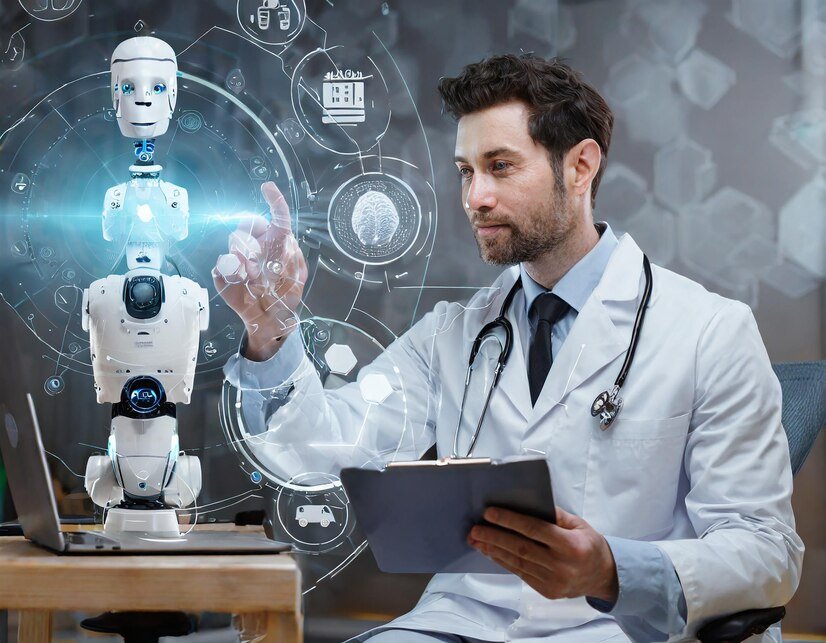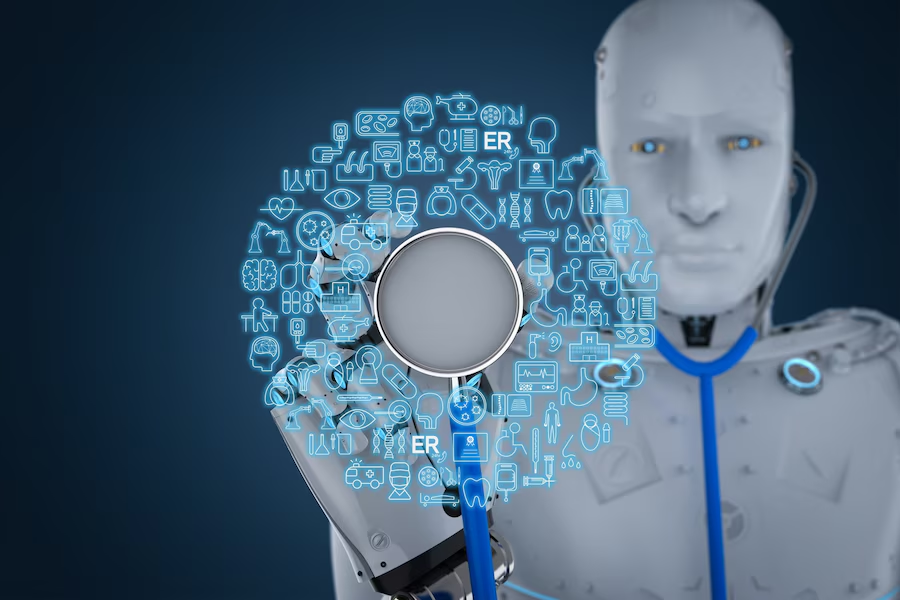Introduction
Man-made reasoning (computer based intelligence) and AI (ML) are progressively becoming crucial advancements in medical services, changing AI in healthcare everything from diagnostics and therapy plans to functional proficiency and medication revelation. These innovations, fueled by huge machine learning medical applications measures of information and modern calculations, offer the possibility to fundamentally work on understanding consideration, smooth out authoritative cycles, and advance clinical exploration. The utilization of man-made intelligence and ML isn’t just upgrading the precision of judgments yet in addition giving more customized treatment choices, working on quiet results, and empowering more effective asset assignment. This article investigates how man-made intelligence and ML are reshaping medical services, the difficulties that go with their coordination, and the expected answers for these difficulties.
AI in Medical Diagnostics
One of the most extraordinary uses of computer based intelligence and AI in medical services is in clinical diagnostics. Computer based intelligence AI in healthcare frameworks, especially those fueled by profound learning calculations, can dissect clinical pictures like X-beams, X-rays, and CT filters with machine learning medical applications momentous exactness. AI models are prepared on immense datasets of pictures to perceive designs that might be hard for the natural eye to identify. For example, computer based intelligence can assist with distinguishing early indications of infections like malignant growth, coronary illness, and neurological issues.
These man-made intelligence driven indicative devices fundamentally lessen the possibilities of misdiagnosis, upgrade early identification, and at last work on quiet results. As these innovations advance, we can expect significantly more exact and quick diagnostics, empowering specialists to really go with informed choices quicker and that’s only the tip of the iceberg.
Personalized Medicine
Simulated intelligence and AI are empowering another period of customized medication, where treatment plans are custom-made to the singular AI in healthcare patient instead of following a one-size-fits-all methodology. By dissecting hereditary data, clinical history, and way of life information, computer based machine learning medical applications intelligence can distinguish the best medicines for explicit patients. AI calculations can foresee how a patient will answer various meds in light of their hereditary cosmetics, assisting with keeping away from unfriendly medication responses and work on remedial viability. In oncology, for instance, computer based intelligence can examine a growth’s hereditary profile and suggest designated treatments that offer the most obvious opportunity with regards to progress. Customized medication vows to work on persistent results while lessening pointless medicines and medical care costs.
AI in Drug Discovery
The medication disclosure process is generally tedious and costly, frequently requiring years and billions of dollars to put up another medication AI in Drug for sale to the public. Man-made intelligence and AI are changing this cycle by empowering scientists to recognize potential medication up-and-comers considerably more rapidly and precisely. By dissecting huge datasets of substance machine learning medical applications compounds and their collaborations with natural frameworks, AI calculations can anticipate the viability of new medications before they go through exorbitant clinical preliminaries. Artificial intelligence can likewise assist with distinguishing expected aftereffects, making the course of medication disclosure more secure and more productive. Moreover, simulated intelligence can assist with planning new particles for drugs focusing on infections that have recently been hard to treat, like interesting hereditary issues or malignant growths.
Foreseeing and Preventing Health Crises
Prescient examination, controlled by man-made intelligence and AI, is turning into a fundamental device in forestalling wellbeing AI in healthcare emergencies. By examining information from different sources, including electronic wellbeing records (EHR), wearables, and, surprisingly, virtual entertainment, machine learning medical applications simulated intelligence models can recognize drifts and anticipate episodes or individual wellbeing gambles before they become basic. For instance, AI calculations can anticipate which patients are in danger of creating ongoing circumstances like diabetes or coronary illness by breaking down designs in their way of life and clinical history. Man-made intelligence can likewise be utilized to foresee the probability of clinic readmissions, permitting medical services suppliers to go to precaution lengths. The capacity to anticipate and forestall wellbeing emergencies could assist with saving lives, decrease medical services costs, and work on generally general wellbeing.
AI in Robotics
Man-made intelligence driven mechanical technology are changing the field of a medical procedure by giving exceptional accuracy AI in healthcare and control. Automated careful frameworks, like the da Vinci Careful Framework, use computer based intelligence to help specialists in carrying out negligibly machine learning medical applications obtrusive systems with more noteworthy exactness and less gamble to patients. These robots can handle continuous information from different sensors, giving the specialist itemized bits of knowledge during the methodology.
Simulated intelligence calculations additionally break down careful results and give input to further develop methods and anticipate potential inconveniences. What’s more, simulated intelligence in mechanical technology is empowering the advancement of completely independent careful robots fit for playing out particular kinds of medical procedures freely, further working on the speed and accuracy of operations.

Virtual Health Assistants
Virtual wellbeing associates, controlled by simulated AI in healthcare intelligence, are progressively being utilized to help the two patients and medical care suppliers. These computer based intelligence fueled apparatuses can help patients in overseeing constant circumstances, answer clinical questions, machine learning medical applications and give suggestions to medicine or arrangements. For instance, computer based intelligence driven chatbots can direct patients through normal clinical worries, offer emotional wellness backing, and even emergency side effects to decide if they need prompt consideration.
On the supplier side, computer based intelligence can assist with overseeing patient information, robotize managerial errands, and aid clinical direction. Virtual wellbeing collaborators are making medical services more open and productive, working on understanding commitment, and permitting medical care experts to zero in on additional perplexing assignments.
AI for Mental Health
Psychological wellness care is a quickly developing field where computer based intelligence and AI are having a significant effect. Simulated intelligence AI for Mental Health apparatuses are being created to assist with diagnosing emotional well-being conditions like discouragement, tension, and schizophrenia by breaking down discourse designs, looks, and conduct information. AI models can identify inconspicuous signs of emotional well-being issues that might slip by everyone’s notice by medical care suppliers. Moreover, artificial intelligence driven chatbots and virtual specialists are being utilized machine learning medical applications to offer prompt help to people encountering psychological well-being emergencies.
These apparatuses assist with overcoming any barrier in emotional wellness care, particularly in underserved regions or for people who might be hesitant to look for conventional treatment. By making psychological well-being administrations more available and customized, man-made intelligence is adding to better mental prosperity for patients.
AI in Healthcare Administration
Past clinical applications, man-made intelligence is likewise assuming an essential part in medical services organization. The medical services AI in healthcare industry is infamous for its managerial shortcomings, with medical care suppliers investing a lot of energy in undertakings like charging, planning, and desk work. Artificial intelligence can smooth out these cycles via robotizing dull errands, decreasing machine learning medical applications human mistake, and working on functional productivity. For instance, man-made intelligence calculations can mechanize the handling of protection claims, opening up medical services staff to zero in on understanding consideration. Man-made intelligence can likewise be utilized to advance clinic staffing by anticipating patient volumes, guaranteeing that assets are apportioned productively. By working on regulatory work processes, man-made intelligence lessens expenses and improve the general patient experience.

Ethical Considerations and Challenges in AI Healthcare
Regardless of the tremendous capability of man-made intelligence and AI in medical services, there are huge moral difficulties that should be tended to. One of the essential worries is information security, as computer AI in healthcare based intelligence frameworks depend on admittance to delicate patient data. Guaranteeing that this information is secure and utilized capably is fundamental. Another moral issue is the potential for algorithmic predisposition, where computer based intelligence frameworks might support existing disparities in medical services, for example, separation machine learning medical applications in view of race, orientation, or financial status.
It is vital to foster straightforward and responsible computer based intelligence frameworks that can be reviewed and checked for reasonableness. Furthermore, as computer based intelligence takes on more dynamic obligations in medical services, inquiries around responsibility and the job of human clinicians emerge. Guaranteeing that computer based intelligence supplements as opposed to replaces human judgment will be basic in keeping up with trust in medical services frameworks.
The Future of AI in Healthcare
Looking toward the future, the job of artificial intelligence and AI in medical services is supposed to dramatically extend. As AI in healthcare the innovation keeps on advancing, artificial intelligence will turn out to be considerably more incorporated into ordinary clinical practices. Customized medication will turn into the standard, with computer based intelligence fueled apparatuses giving ongoing bits of knowledge custom-made to individual patients. Medical services frameworks will turn out to be more proactive, utilizing prescient examination to forestall infections before they happen. Besides, the utilization of man-made intelligence will work with worldwide admittance machine learning medical applications to medical services, empowering distant conferences, conclusion, and therapy in underserved areas.
Nonetheless, as the extent of simulated intelligence’s job in medical care develops, it is fundamental to guarantee that moral guidelines, security securities, and human oversight stay vital to the turn of events and arrangement of computer based intelligence advances in medication. By tending to these difficulties, simulated intelligence will keep on changing medical care to improve things, working on persistent results and making medical care more open and productive for all.
Conclusion
Artificial intelligence and AI are not simply changing medical care — they are reforming the whole medical services biological system. From diagnosing AI in healthcare infections to customizing medicines and working on functional effectiveness, these advancements offer exceptional chances to upgrade the nature machine learning medical applications of care and decrease medical care costs. Notwithstanding, likewise with any strong innovation, moral contemplations should stay at the front to guarantee that man-made intelligence’s true capacity is completely acknowledged in a manner that is straightforward, fair, and secure. By tending to the difficulties related with computer based intelligence in medical care, society can tackle the maximum capacity of these advancements to make a more powerful, impartial, and open medical care framework for what’s in store.


